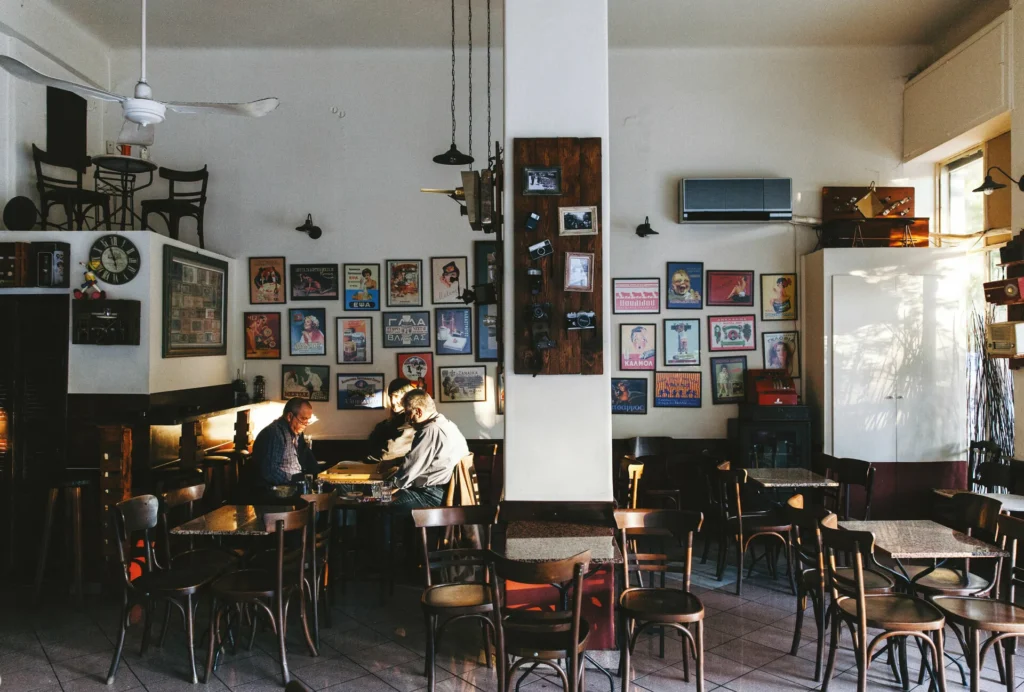The Greek Coffee Culture: Why Kafeneios Are the Heart of Social Life

In Greece, coffee is more than just a drink—it’s a way of life. From traditional kafeneios to modern cafés, coffee culture plays a vital role in Greek society. It’s where people gather to talk, debate, and unwind, making these establishments the beating heart of social life.
1. The History of Greek Coffee Culture
Coffee arrived in Greece during the Ottoman era, and since then, it has evolved into an essential part of daily life. Kafeneios, the traditional Greek coffeehouses, have been around for centuries, serving as meeting places for philosophers, politicians, and locals looking to discuss everything from politics to sports.
2. What is a Kafeneio?
A kafeneio is more than just a café—it’s a cultural institution. These traditional coffeehouses, found in villages and city neighborhoods alike, are where people come together to socialize, play tavli (backgammon), and catch up on local news. While historically dominated by older men, many kafeneios today welcome a diverse mix of customers, keeping the tradition alive in a modern setting.
3. The Role of Coffee in Greek Daily Life
In Greece, coffee isn’t something to be rushed. Unlike in many Western countries where coffee is consumed on the go, Greeks prefer to sip and savor their drinks for hours. Whether it’s a morning ritual or an afternoon gathering, coffee serves as an excuse to pause and connect with others.
4. The Most Popular Greek Coffees
Greece has its own unique coffee specialties, each with its own character and charm:
Greek Coffee (Ellinikos Kaffes) – A strong, unfiltered coffee served in a small cup, often accompanied by a glass of water.
Frappé – A foamy, iced instant coffee, popular during the summer.
Freddo Espresso – A chilled espresso served over ice, giving a strong yet refreshing taste.
Freddo Cappuccino – A variation of the Freddo Espresso with a creamy froth on top.
5. Kafeneios as Community Hubs
Kafeneios serve as more than just coffee spots—they are places of conversation, connection, and tradition. They bring together people of all generations, offering a welcoming space to discuss politics, life, and everything in between. In small towns and villages, kafeneios often act as unofficial town halls where major community decisions are made over a cup of coffee.
6. The Evolution of Greek Coffee Culture
While traditional kafeneios continue to thrive, modern coffee shops have also become an essential part of Greek urban culture. In cities like Athens and Thessaloniki, specialty cafés attract younger crowds, blending tradition with contemporary coffee trends. Despite these changes, the Greek love for long, relaxed coffee gatherings remains unchanged.
7. The Unwritten Rules of Greek Coffee Culture
Take your time – Rushing through coffee is unheard of in Greece. Enjoy it slowly.
Conversation is key – Coffee is meant to be enjoyed with good company and deep discussions.
Respect the tradition – Whether in a historic kafeneio or a trendy café, coffee is about more than just caffeine—it’s a ritual.
Final Thoughts
Greek coffee culture is a reflection of the country’s deep-rooted love for social connection and tradition. Whether in a bustling city café or a quiet village kafeneio, the experience of sharing a cup of coffee in Greece is one of life’s simple yet profound pleasures. So next time you visit Greece, take a seat, order a coffee, and immerse yourself in the heart of Greek social life.